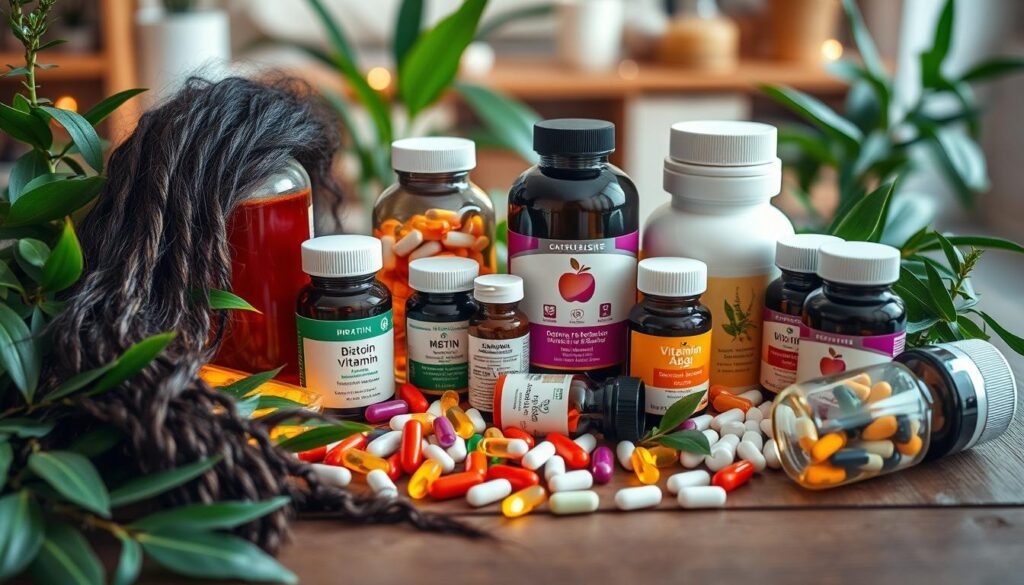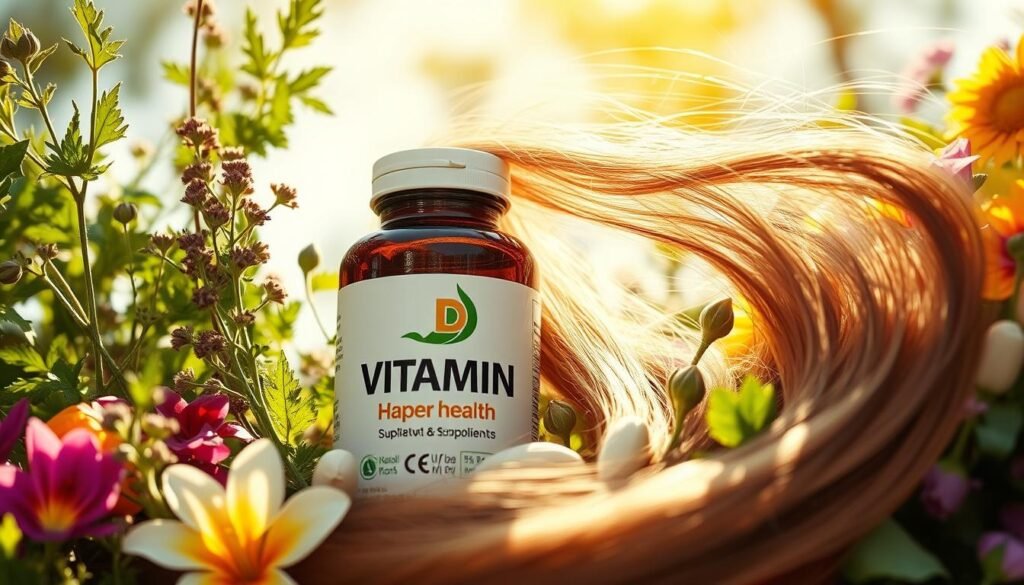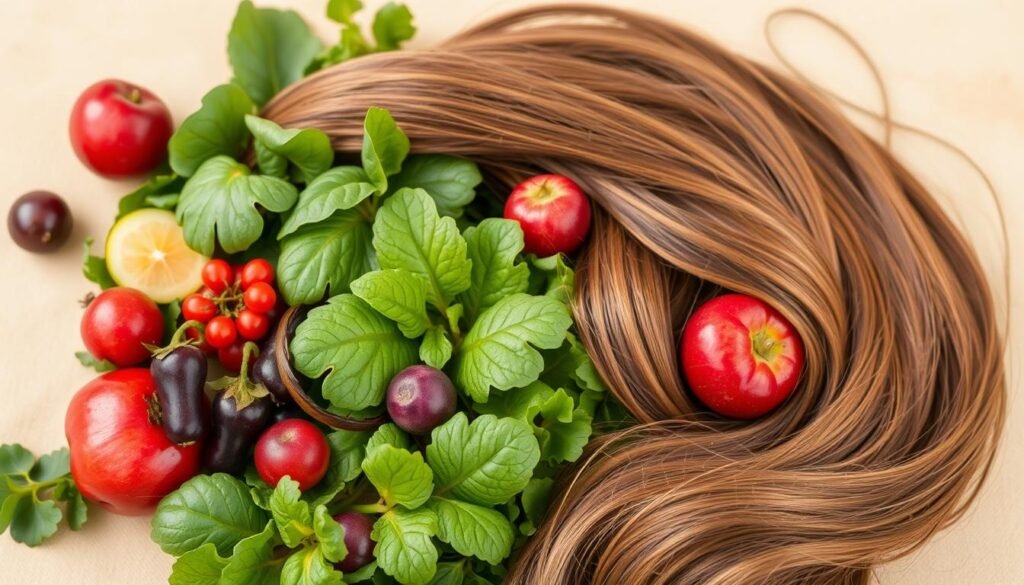It might be surprising, but almost half of all women face hair loss by the time they turn 50. Around 80% of those experiencing hair loss seek help through supplements. This underscores the vitamins’ role in fostering hair growth for women. We’ll explore the most beneficial vitamins for combating hair loss in women, backed by science and expert advice.
Arming with the right knowledge can lead women towards the path of stronger, fuller hair. Biotin, vitamin D, iron, and folic acid each support hair health in unique ways. Yet, it’s key to understand that vitamins alone may not fix the problem without tackling any underlying issues. For deeper insights into hair loss and nutrition, take a look at nutrition and vitamins.
Examining herbal remedies and supplements can provide a holistic approach to combating hair loss. This article helps clear the confusion about which supplements are the most effective for women.
Key Takeaways
- Nearly 50% of women experience hair loss by age 50.
- 80% of individuals with hair loss have tried nutritional supplements.
- Specific vitamins play significant roles in supporting hair health.
- Underlying deficiencies need to be addressed for supplements to be effective.
- Consulting expert recommendations can guide supplementation strategies.
- Combining vitamins with herbal remedies enhances overall effectiveness in promoting hair growth.
Understanding Hair Loss in Women
Hair loss in women can be distressing. It often means shedding more than 125 hairs daily. This can lead to visible thinning and even bald patches. Recognizing the causes of hair loss in women is key to finding solutions. Common types include androgenetic alopecia, telogen effluvium, and alopecia areata. Different factors cause them, needing targeted attention.
Statistics show that about 50% of women will face hair loss. Genetics and hormonal changes greatly affect hair growth. Stress and lifestyle can make it worse. Knowing how diet, especially lack of vitamins and minerals, affects hair is crucial.
Many women try female hair loss treatment vitamins. Vitamins A, B, C, D, and E, with iron and zinc, can help keep hair. But, talking to a doctor for the right diagnosis and treatment is important.
Common Causes of Hair Loss in Women
Hair loss in women can come from many sources. About half of women will face this issue at some point. The main reason is often hereditary hair loss, like female pattern baldness. About 30 million American women are affected.
Changes in hormones and hair loss are closely linked. Pregnancy, menopause, or issues with the thyroid can all alter hair health. Hormone imbalances, particularly from conditions like PCOS, may cause hair to thin or fall out. Similarly, stress can lead to hair loss. Events like childbirth, getting over an illness, or surgeries can cause more hair to shed than usual.
Nutritional deficiencies also contribute to hair loss. Lack of iron, protein, and vitamins can make the issue worse. Hair can be damaged by certain styling practices or harsh products, adding to hair loss. Cancer treatments might cause significant hair loss quickly. Stress, either physical or emotional, can also trigger hair shedding.
Understanding the reasons behind hair loss is crucial. Seeing a dermatologist early can help with hair regrowth. Addressing dietary and hormonal issues is important. You can find more information on health conditions and hair loss here. For common causes of hair loss, click here.
The Role of Vitamins in Hair Health
Vitamins are very important for our health, especially for our hair growth and care. Studies show certain vitamins for thinning hair in women are needed for making collagen, fixing cells, and keeping the scalp healthy. Not having enough of these vitamins can badly affect hair quality and growth.
Women who are losing hair need certain nutrients for healthy hair growth. These include B vitamins, vitamin C, vitamin D, and iron. Reports say many women with hair loss have low levels of these vitamins. For instance, 38% of women with hair loss had too little biotin, which is crucial for hair health.
To fix these shortages, dietary supplements for hair loss might help. But, eating a balanced diet full of these vitamins is usually a better choice. Be careful with supplements. Taking too many vitamins can cause harm or even more hair loss. In the U.S., supplements are not very strictly regulated. This means the labels might not always match what’s inside the bottle.
Understanding vitamins and keeping the right nutrient levels can really improve hair health. This is very helpful for women experiencing hair thinning or loss.
Essential Vitamins for Hair Growth
Various vitamins are key for healthy hair. Knowing which ones help with female hair loss is important. Each vitamin adds something special to our hair’s health. They offer *nutritional support for hair growth*. This ensures our hair follicles are strong and lively.
- Vitamin A: It supports cell growth, including in hair follicles. This leads to healthier hair. Carrots, sweet potatoes, and spinach have plenty of it.
- Vitamin B-complex: Vital for energy and health, B vitamins, especially biotin, are great for hair. Find them in eggs, almonds, and avocados.
- Vitamin C: It’s important for making collagen. This keeps hair strong. Citrus fruits, strawberries, and kiwi are full of Vitamin C.
- Vitamin D: It’s linked to the life cycle of hair follicles. Not enough Vitamin D can cause hair loss. Fatty fish and fortified foods help increase it.
- Vitamin E: Its antioxidant effects improve blood flow to the scalp. This promotes hair growth. Nuts, seeds, and leafy greens are good sources.
- Folic Acid: Helping with cell division, it boosts hair growth. Choose leafy greens and legumes for this vitamin.
Eating well, with these vitamins, does wonders for hair growth. For those needing more, try Nutrafol Hair Growth Supplements or Vegamour Gro Biotin Gummies. But, it’s wise to talk with a doctor before starting any supplements. They can suggest what’s best for you. To learn more about key vitamins and supplements for hair loss prevention, visit this link.

Vitamin for Hair Loss Female: Biotin
Biotin, also known as vitamin B7, is essential for hair health. Not having enough biotin can cause hair problems. This includes hair thinning and loss. Many women try biotin supplements to improve their hair. Knowing the best biotin sources can help make a diet that supports strong, healthy hair.
Benefits and Sources of Biotin
Benefits of biotin for hair are known from research. Studies found 18 cases where biotin made hair and nails better. Some patients with genetic issues saw their hair improve with biotin. Good biotin sources include:
- Egg yolk
- Beef liver
- Nuts and seeds
- Legumes
- Mushrooms
- Salmon
- Various fruits and vegetables
These foods are great for better hair health. Eating them often helps keep biotin levels up in the body.
Recommended Dosage for Biotin
How much biotin to take can differ from person to person. Usually, 30 mcg a day is enough, but some may need more. Studies have used 300 μg to 30,000 μg daily. Hair can get better between 2 to 6 months after starting biotin. How much biotin is too much is not clear. Side effects are rare. Always talk to a doctor before starting biotin.
Vitamin D and Its Impact on Hair Health
Vitamin D is key for healthy hair, influencing how hair follicles grow. Low levels of vitamin D can cause hair loss. A study in 2021 linked low vitamin D to androgenetic alopecia and alopecia areata.
There’s a close link between sunlight and hair health. Skin makes vitamin D when in the sun. The NIH suggests adults need 600 IU daily. For better hair, getting enough vitamin D from the sun and food is vital.
Eating vitamin D-rich foods like fatty fish and fortified dairy helps. Enough vitamin D can lead to more hair follicles. This keeps hair thick and prevents early loss. Dr. Keene advises keeping serum vitamin D between 40-100 ng/ml for hair health.

Research shows people with alopecia areata often have lower vitamin D. Taking supplements can help. One case saw significant hair growth after 6 weeks of vitamin D supplements.
Always talk to a doctor before starting vitamin D supplements. This ensures safe and effective use. Meeting vitamin D needs is a smart way to improve hair health and fight hair loss.
| Source of Vitamin D | Vitamin D Content per Serving | Additional Benefits |
|---|---|---|
| Fatty Fish (e.g., salmon) | 570 IU per 3.5 oz | Rich in omega-3 fatty acids |
| Fortified Milk | 120 IU per cup | Source of calcium |
| Egg Yolks | 37 IU per yolk | Contains high-quality protein |
| Mushrooms (exposed to UV light) | 450 IU per cup | Antioxidant properties |
Vitamin E: An Antioxidant for Hair Growth
Vitamin E is key for healthy hair because of its antioxidant effects on hair health. It helps reduce oxidative stress, which can cause hair to age and fall out. By eating foods rich in this nutrient, blood flow to the scalp improves. This nourishes hair follicles and encourages vitamin E for hair growth.
How Vitamin E Supports Healthy Hair
Studies show that vitamin E might prevent hair loss and bring back natural shine. However, more research is needed to understand its direct effect on hair growth. Still, adding vitamin E to your daily diet is good for hair care.
Food Sources Rich in Vitamin E
It’s easy to get enough vitamin E by eating the right foods. Here are some top sources:
| Food Item | Vitamin E Content (milligrams) |
|---|---|
| Wheat Germ Oil (1 tbsp) | 20.3 |
| Dry Roasted Sunflower Seeds (1 oz) | 7.4 |
| Dry Roasted Almonds (1 oz) | 6.8 |
| Peanut Butter (2 tbsp) | 2.9 |
| Boiled Spinach (½ cup) | 1.9 |
| Boiled Broccoli (½ cup) | 1.2 |
Adults need about 6 to 10 mg of vitamin E daily. This depends on age and health. Foods like vegetable oils, nuts, and green veggies make it easy to meet this goal. A balanced diet benefits not just your hair but your overall health too.
Vitamin C: A Key Player in Collagen Production
Vitamin C is key for healthy hair, thanks to its role in making collagen. Collagen is a protein that gives hair follicles their strength. Without enough vitamin C, our body can’t make enough collagen. This can lead to hair loss and weak hair. Knowing how vitamin C benefits hair shows how it supports hair growth and health.
Vitamin C and Hair Follicle Health
Vitamin C is essential for good hair because it helps make collagen. As we get older, the amount of vitamin C in our skin goes down. This affects hair follicles. UV rays from the sun can also lower vitamin C levels. We need enough vitamin C from our diet for healthy hair. Men need 90 mg and women need 75 mg of vitamin C daily.
Vitamin C is also a strong antioxidant. It protects hair follicles from damage. Getting enough vitamin C can make hair stronger and more flexible. This helps prevent breakage. Overall, it supports hair health, allowing it to grow better and resist harm. Taking vitamin C supplements can increase its levels in the skin. This leads to healthier hair.
It’s important to find different sources of vitamin C to improve hair health and strength. By focusing on this vital nutrient, people can enjoy better hair thickness, less hair fall, and improved follicle function.
The Importance of Iron for Hair Growth
Iron is key for keeping hair healthy because it helps bring oxygen to the hair roots. Not having enough iron can cause hair loss, especially in women. This problem often comes from not eating enough iron-rich foods or from changes in the body like during periods or pregnancy.
Studies show that women with hair loss tend to have lower iron levels than healthy ones. On average, those with hair problems have 49.27 µg/L of iron in their blood, while healthy people have 77.89 µg/L. This big difference proves that checking iron levels is important when dealing with hair loss. Not having enough iron can make your hair health worse, pointing out how essential it is in our diets.
Premenopausal women, in particular, often have lower iron levels, around 30.67 µg/L, compared to healthy women who have about 69.32 µg/L. These findings stress the need to tackle iron deficiency to prevent hair loss. As a result, many women consider iron supplements to raise their iron levels and possibly boost their hair’s growth and health.
Dietary Sources of Iron
To fight iron deficiency, it’s crucial to eat more iron-rich foods:
- Red meat
- Beans and legumes
- Spinach and leafy greens
- Quinoa
- Nuts and seeds
While iron pills might help those with low iron, it’s important to keep an eye on levels to prevent too much iron, which is bad. Always talk to a doctor before taking iron supplements to make sure your iron is balanced properly.
| Group | Average Serum Ferritin (µg/L) | Iron Concentration (µg/dL) | Total Iron Binding Capacity (TIBC) (µg/dL) |
|---|---|---|---|
| FPHL Patients | 49.27 | 90.89 | 346.30 |
| Healthy Controls | 77.89 | 132.30 | 319.85 |
Knowing how iron deficiency affects hair loss helps us make smarter health choices. By managing iron levels through diet and, when needed, supplements, we can better support hair growth.
Folic Acid: Supporting Keratin Production
Folic acid is key for keratin and hair growth. This B vitamin is essential for making keratin, which is what hair is made of. Not having enough folic acid can cause thinning and loss of hair. Getting enough folic acid can make your hair stronger and more vibrant.

Leafy greens, fruits, beans, and fortified grains are great sources of folic acid. Eating these foods helps keep the right levels of this nutrient. Adults should get 400 micrograms daily, and pregnant women need more.
Research shows folic acid helps keep the metabolism of cells in check. These cells are in charge of making keratin, which leads to healthier hair. It also improves blood flow to the scalp. This can lessen scalp inflammation and improve its health. Results can vary, but adding folic acid to your routine is a good move.
| Folic Acid Benefits | Description |
|---|---|
| Promotes keratin production | Supports the structure of hair strands, leading to stronger hair. |
| Enhances blood circulation | Improves scalp health and may reduce hair loss. |
| Aids in cellular metabolism | Encourages healthy cell growth for more robust hair. |
| Supports overall health | Reduces potential health issues that can impact hair vitality. |
Using folic acid with vitamins B12 and biotin can be even better. These nutrients work together to help your hair grow healthy and strong. They’re an important part of taking care of your hair.
Conclusion
Taking care of hair loss in women needs a full approach that looks at nutrition, lifestyle, and medical past. Vital nutrients like biotin and vitamins D, E, C, and iron are key for healthy hair and stopping hair loss. Studies show that fixing vitamin D shortage can really help hair grow back, with normalized levels bringing visible changes.
While taking supplements might help those lacking vitamins from their food, eating whole foods is usually better. Foods packed with these important vitamins help not just your hair but your whole health. If you’re losing hair, it’s a good idea to talk to a doctor to get the right help.
To keep your hair healthy, eat well, keep an eye on your vitamin levels, and get advice from experts. By focusing on getting the right nutrients and possibly adding supplements, you can see real improvements in your hair’s health over time.